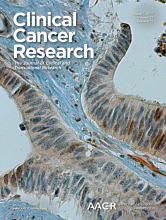 A 2016 paper exploring the biology of prostate cancer has been retracted due to figure manipulation.
A 2016 paper exploring the biology of prostate cancer has been retracted due to figure manipulation.
According to the retraction notice, a reader contacted the journal Clinical Cancer Research in late 2016 with concerns that similar bands appeared multiple times in two images. The editors asked the paper’s corresponding author, Shahriar Koochekpour, about the issue and requested the raw data for the figures. But Koochekpour, based in the Departments of Cancer Genetics and Urology at Roswell Park Cancer Institute in Buffalo, New York, at the time of the study, could not locate the raw data.
Since the lab did not have raw data from such a relatively recent paper, the editors reached out to the research integrity officer at Roswell Park Cancer Institute to investigate. Indeed, the research integrity officer contacted confirmed that two figures were problematic, and requested the paper be retracted.
Here’s the rather detailed retraction notice, published in July 2017, for “GRM1 is An Androgen-Regulated Gene and its Expression Correlates with Prostate Cancer Progression in Pre-Clinical Models:”
The article entitled, “GRM1 is An Androgen-Regulated Gene and its Expression Correlates with Prostate Cancer Progression in Pre-Clinical Models,” which was published in the OnlineFirst section of Clinical Cancer Research’s website on July 25, 2016 (1), is being retracted at the request of Roswell Park Cancer Institute, which is one of the study sponsors and the institution of the corresponding author.
In late 2016, a concerned reader alerted the Clinical Cancer Research editorial office of potential image manipulation in the article; specifically, that similar DNA bands (RT-PCR gel) from the GRM1 (glutamate receptor M1) gene were used multiple times in Figs. 1D and 4D.
To review the material further, the Clinical Cancer Research editorial office contacted the corresponding author, Shahriar Koochekpour, asking for the raw data for Figs. 1D and 4D and received a response indicating that he was unable to locate the flash card containing the gel electrophoresis data, but that he could repeat the experiment using frozen samples. Because laboratories typically keep data for an established period of time and repeating experiments now would not change the published record, the Clinical Cancer Research editorial office contacted the Research Integrity Officer for Roswell Park Cancer Institute, informed them of the matter, and asked them to perform an investigation.
The Research Integrity Officer recently contacted the Clinical Cancer Research editorial office and requested a retraction of the article based on the results of their investigation, stating, “The article must be retracted due to Figs. 1D and 4D.”
The matter was reviewed by members of the AACR Publications staff and the Clinical Cancer Research editors, who agreed that the figure manipulation present in the article merits retraction. A copy of this notice was sent to all authors: 9 of the 14 authors (Gissou Azabdaftari, Kristopher Attwood, Kristine Wadosky, Bryan Gillard, Ellen Karasik, Hannelore Heemers, Irwin Gelman, Eva Corey, and Robert L. Vessella) consented to this retraction; the remaining 5 authors (Mojgan Shourideh, Adam DePriest, Natasha Kyprianou, James L. Mohler, and Shahriar Koochekpour) did not respond.
The paper has not yet been indexed by Clarivate Analytics’ Web of Science.
The research was supported by several grants from the National Cancer Institute.
We asked a spokesperson from Roswell Park Cancer Institute for more details about the investigation, and if we could have a copy of the report. She told us:
The circumstances of this matter have been publicly reported. We have nothing further to add.
The paper’s second-to-last author, James Mohler, chair of the Department of Urology at Roswell Park Cancer Institute, told us he did not know any further details about the investigation, either.
A representative of the publisher, AACR, told us:
…we take seriously [the] confidentiality of any investigations that might lead to a correction of the literature.
We also reached out to Koochekpour, and will update the post if we hear back. Koochekpour’s LinkedIn profile still lists him at Roswell Park, but the link to his lab’s website no longer works. He is not on the faculty page in the Department of Cancer Genetics and Genomics, though his name does appear on the urology fellowship page (the link, however, goes to a page that says “access denied”). We asked the spokeswoman for Roswell Park whether Koochekpour still works at the institute and will update when we hear back.
In 2014, Roswell Park announced that Koochekpour was awarded a two-year, $406,247 grant from the National Cancer Institute to investigate the potential to use a drug for amyotrophic lateral sclerosis to treat prostate cancer.
Like Retraction Watch? Consider making a tax-deductible contribution to support our growth. You can also follow us on Twitter, like us on Facebook, add us to your RSS reader, sign up on our homepage for an email every time there’s a new post, or subscribe to our daily digest. Click here to review our Comments Policy. For a sneak peek at what we’re working on, click here.
Somebody going to return the $406,247 to the taxpayers?
Will RW do more for getting access to the investigation report?
It would be interesting to get more details, eg. did they include additional
articles or did they only sweep the problem under the carpet?
Scientists and cancer patients deserve more transparency!